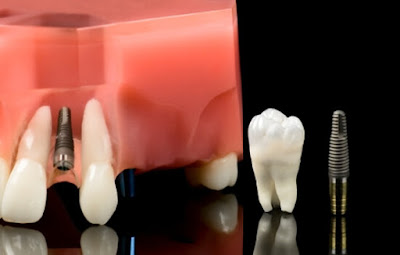Welcome to our comprehensive guide on how to restore your smile with state-of-the-art dental implants. If you're looking for a long-term solution to replace missing teeth and regain your confidence, dental implants offer a fantastic option. In this article, we will delve into the world of dental implants, exploring their benefits, the implantation process, aftercare, and more. Whether you're already considering dental implants or simply curious about the procedure, this guide will provide you with all the information you need to make an informed decision.
Understanding Dental Implants
Dental implants are revolutionary prosthetic teeth designed to replace missing or damaged teeth. Unlike traditional dentures or bridges, implants are surgically anchored into your jawbone, providing a secure and durable foundation for artificial teeth. These implants consist of titanium posts that fuse with the jawbone, acting as artificial tooth roots. With the implant in place, a custom-made crown is attached, resulting in a natural-looking and functional replacement tooth.
Advantages of Dental Implants
1. Improved Aesthetics: Dental implants not only restore functionality but also enhance the appearance of your smile. The crown attached to the implant is custom-made to match the color, shape, and size of your natural teeth, ensuring a seamless integration.
2. Enhanced Chewing and Speech: Missing teeth can significantly impact your ability to chew food properly or speak clearly. Dental implants restore these essential functions, allowing you to enjoy a varied diet and speak with confidence.
3. Longevity: When properly cared for, dental implants can last a lifetime. This makes them a cost-effective solution in the long run, as they eliminate the need for frequent replacements or repairs.
4. Preservation of Jawbone: When a tooth is lost, the jawbone can begin to deteriorate over time. Dental implants stimulate the bone, preventing bone loss and maintaining the structure of your face.
The Dental Implant Process
Consultation and Treatment Planning
The first step in the dental implant process is a comprehensive consultation with a qualified dentist. During this appointment, the dentist will evaluate your oral health, discuss your treatment goals, and determine if you're a suitable candidate for dental implants. X-rays and 3D scans may be taken to assess the condition of your jawbone and plan the implant placement.
Implant Placement
Once you've been deemed a candidate for dental implants, the implant placement procedure can begin. This is typically performed under local anesthesia to ensure a comfortable experience. The dentist will make a small incision in the gum tissue, exposing the jawbone. A hole is then drilled into the bone, and the titanium implant is carefully inserted. Over time, the implant fuses with the jawbone through a process called osseointegration.
Healing and Osseointegration
Following implant placement, a period of healing is necessary to allow the implant to bond with the jawbone. This process, known as osseointegration, typically takes several months. During this time, the jawbone grows around the implant, providing a stable foundation for the artificial tooth.
Crown Placement
Once osseointegration is complete, an abutment is attached to the implant. This abutment serves as a connector between the implant and the crown. The dentist will take impressions of your teeth to create a custom-made crown that matches the color, shape, and size of your natural teeth. Finally, the crown is securely placed on the abutment, completing the dental implant procedure.
Aftercare and Maintenance
Proper aftercare and maintenance are essential for the long-term success of dental implants. Here are some key points to keep in mind:
- Maintain good oral hygiene by brushing and flossing regularly.
- Attend regular dental check-ups to monitor the condition of your implants and overall oral health.
- Avoid chewing on hard objects or biting down with excessive force, as this can damage the implant.
- If you grind your teeth at night, consider using a nightguard to protect your implants.
- Quit smoking, as it can hinder the healing process and increase the risk of implant failure.
Are dental implants painful?
No, dental implant surgery is performed under local anesthesia, ensuring that you feel no pain during the procedure. Afterward, some discomfort and swelling may occur, but it can be managed with over-the-counter pain medications and ice packs.
How long do dental implants last?
Dental implants are designed to be a permanent solution for tooth replacement. With proper care and regular dental check-ups, implants can last a lifetime.
Is everyone a suitable candidate for dental implants?
While most individuals with healthy gums and sufficient jawbone density are suitable candidates for dental implants, some factors, such as uncontrolled diabetes or heavy smoking, may affect the success of the procedure. A consultation with a qualified dentist will determine your eligibility.
How much do dental implants cost?
The cost of dental implants varies depending on several factors, including the number of implants required, any additional procedures needed, and geographical location. It's best to consult with your dentist to receive an accurate cost estimate based on your specific case.
Can dental implants replace multiple missing teeth?
Yes, dental implants can be used to replace multiple missing teeth. Implant-supported bridges or dentures can be customized to restore a full arch of teeth, providing a natural-looking and functional smile.
How soon can I return to normal activities after dental implant surgery?
The recovery period after dental implant surgery varies from person to person. Most individuals can resume their normal activities within a few days to a week. However, it's important to follow your dentist's post-operative instructions to ensure proper healing.
Conclusion
If you're seeking to restore your smile and regain confidence, state-of-the-art dental implants offer an excellent solution. By replacing missing teeth with durable and natural-looking prosthetics, dental implants provide numerous advantages in terms of aesthetics, functionality, and oral health. Consult with a qualified dentist to determine if dental implants are the right option for you. With proper care and maintenance, you can enjoy a beautiful smile for years to come.
If you are searching for professional Dental Implants in Mumbai, visit us for best information about dental implants treatment website: https://drroshandental.com/




